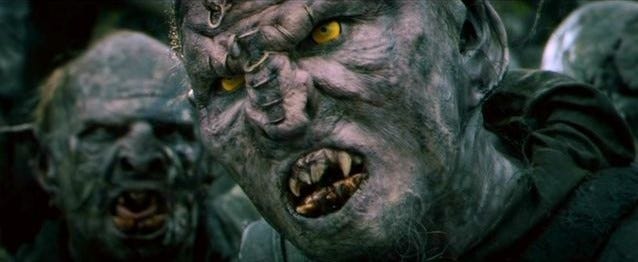Tolkien’s orcs are, as characters in The Lord of the Rings, often misread. Of the several conversations that take between orcs that readers are exposed to in the book, that of Shagrat and Gorbag in the final chapter of The Two Towers is often cited as an example of Tolkien essentially forgetting that the orcs are actually evil monsters. They become characters and therefore obtain humanity, in apparent contradiction to the monstrous features they are described as possessing (claws, fangs, etc). To cite the meme, “was Tolkien just stupid?”
Well, no. I want to argue that these orc conversations admit of a sort of double irony which many readers seem to miss. After all, readers are tempted to sympathise with the orcs in their desires to escape the thralldom of Sauron and set up on their own (at least, this is what Shagrat seems to think desirable). Surely such sentiments are not only understandable but laudable? Why therefore should readers be expected to (literally) demonise the orcs in their minds? I think that the orcs, especially here, show us, as Shippey has said, an ‘image of evil’ - a sort of living, monstrous embodiment of the failure of ‘practical reason’. Orcs can, apparently, reason about morality - Shagrat and Gorbag seem to believe that the abandonment of one’s companions is a “regular Elvish trick”. Of course later in the chapter, and in the first Chapter of Book 6, the orcs themselves literally backstab one another, apparently without any sense of irony. The orcs are not, actually, capable of reason, but only of a sort of parodic (re) enactment of it. It is this feature of their behaviour, the deep, ingrained psychosis of it, that many readers seem to miss or overlook; and assume that in humanising the orcs Tolkien has forgotten their erstwhile monstrousness. But no, Tolkien is merely extending the ‘monstrous’ into their mentality - not by making them bestial, but by showing the insidiousness of self-delusion. The tragedy of the orcs, and by extension, those bound by evil will, is that they are incapable of recognising their delusion, even in the midst of their being capable (at least at first glance) of moral reasoning. As Shippey notes, they cannot create an alternative morality where good is bad and bad is good (cf. Nineteen-eighty four); they are instead trapped in their own delusive world-picture from which they are incapable of escaping.
This ties into the metaphysical idea of the ‘corruption’ of the ‘legitimately created’ peoples - Elves, Men, etc. The orcs are not only physically corrupted versions of these, but are psychologically corruptions as well. Perhaps this reading does not solve the question of whether or not the main characters are always depicted as dealing humanely with the orcs, but I think it better captures Tolkien’s intended ‘point’. The orcs are neither fully monstrous nor fully humane - they are in all senses humanity as seen through a glass, darkly.



